|
|
|
Sort Order |
|
|
|
Items / Page
|
|
|
|
|
|
|
| Srl | Item |
| 1 |
ID:
178537


|
|
|
|
|
| Summary/Abstract |
2019 marked the 25th anniversary of normalizing Jordanian-Israeli relations and the ‘warm’ peace-making between the two countries. Representing key partners and neighbours in the Middle East, Jordan and Israel have maintained political and economic ties since 1994. The pro-Western stance of both countries, and their common interest in maintaining regional stability, led Jordan and Israel to pursue similar foreign policy aims regarding various regional upheavals, as well as the Palestine-Israeli dispute. Jordanian-Israeli relations have, however, been caught amidst shifts in the US’s Middle East Policy under the Trump administration, which has raised questions over the status of Jerusalem and the West Bank. With respect to these developments, this article argues that the disaccord between the US/Israel and Jordan over these two places reveals that a politics of identity remains a pillar of the Kingdom’s stability and survival. Although both countries are being confronted with the same regional challenges, particularly in the wake of the war in Syria, the re-emergence of the rhetoric of ‘Jordan is Palestine’ – which poses the country as an alternative homeland for Palestinians (al-watan al-badil) – nowadays constitutes the top security concern for the Hashemite monarchy, and has the potential to undermine Jordanian-Israeli relations going forward.
|
|
|
|
|
|
|
|
|
|
|
|
|
|
|
|
| 2 |
ID:
139247


|
|
|
|
|
| Summary/Abstract |
The settlers constitute a minority group whose goals are becoming increasingly unpopular among Israelis. As a result, the degree of legitimacy granted to them by the government gradually eroded over the years. However, their project still thrives. Their impressive success can be attributed to their focus on the bureaucracy. As early as the 1960s, the settlers engaged in a constant effort to identify actors in state and semi-state agencies that had common interests with them. At first they mobilized supporters from within those agencies. Later they made any effort to fill available positions with their own people. Today, the settlers' movement in Israel has fused itself with the relevant elements within the bureaucracy to a degree that many state agencies serve as extensions of the settler movement.
|
|
|
|
|
|
|
|
|
|
|
|
|
|
|
|
| 3 |
ID:
128054
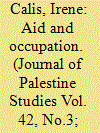

|
|
|
|
|
| Publication |
2013.
|
| Summary/Abstract |
This article foregrounds how international aid and the Israeli occupation intersect in the historically prosperous West Bank agricultural village of Jayyus; with most of its lands isolated behind the Israeli Wall, Jayyus is now aid-dependent. While material aid plays a larger role in sustaining the village, it is through "advocacy work" (a form of international aid largely unaddressed in the literature) that Jayyusis experience aid on a daily basis. The article examines the paradoxes of dependence and subordination seen from the vantage point of local communities under the jurisdiction of an occupying power and in the absence of a sovereign Palestinian state. Also shown is how the routinization of aid both obscures the ongoing status of occupation and has become an important mechanism that sustains it.
|
|
|
|
|
|
|
|
|
|
|
|
|
|
|
|
| 4 |
ID:
100536
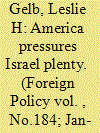

|
|
|
| 5 |
ID:
113621
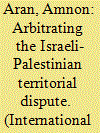

|
|
|
|
|
| Publication |
2012.
|
| Summary/Abstract |
Breaking the current deadlock in the Israeli/Palestinian conflict has thus far proved impossible. However, the suggestion that arbitration should replace negotiations is flawed.
|
|
|
|
|
|
|
|
|
|
|
|
|
|
|
|
| 6 |
ID:
192897
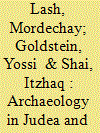

|
|
|
|
|
| Summary/Abstract |
This article examines the trends in archaeological research and the state of conservation of archaeological sites in Judea and Samaria between 1993 and 2022. The absence of Palestinian-Israeli cooperation resulted in the establishment of two parallel bodies that have been responsible for the issue, with no connection between them. In the Israeli-controlled territory, academic involvement declined with only a handful of new excavations. In the Palestinian-controlled territory, many new studies were conducted with foreign assistance, primarily to strengthen Palestinian national identity. An assessment of the state of conservation indicates significant damage as a result of development and antiquities theft. In this region, where the future remains uncertain, relics of the past and the research of these relics appear to have sustained irreversible damage.
|
|
|
|
|
|
|
|
|
|
|
|
|
|
|
|
| 7 |
ID:
115329
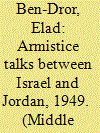

|
|
|
|
|
| Publication |
2012.
|
| Summary/Abstract |
The article examines the armistice talks between Israel and Jordan (March-April 1949) from the perspective of the UN mediator, Ralph Bunche, who coordinated them. The period described was stormy and complex: at its start, Israel took control of the southern Negev. Later, the two countries conducted formal talks in Rhodes, under Bunche's watchful eye, in parallel to informal negotiations, without UN involvement, in Jordan. The article, based to a large extent on Bunche's unpublished diary, explains why Bunche, who maintained rigorous control of all of the other armistice talks, behaved differently in this case, giving his post factum seal of approval to the Israeli takeover of the southern Negev and allowing Israel to pressure Abdullah to hand over the Triangle. The thesis is that Bunche, who could have put an end to the talks by resigning, or drawn the US into the crisis (as he did in the other rounds of negotiations), recognized the complexity of the relations between Israel and Abdullah and chose to act in a way that would prevent a new eruption of hostilities. In effect he was protecting Abdullah, who would have been likely to lose the West Bank to Israel in another round of fighting.
|
|
|
|
|
|
|
|
|
|
|
|
|
|
|
|
| 8 |
ID:
077873
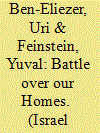

|
|
|
|
|
| Publication |
2007.
|
| Summary/Abstract |
During the Second Intifada, Israel started to construct a separation barrier, officially aimed at preventing Palestinian terrorists from penetrating into its territory. Previous Palestinian attacks caused the death and injury of many innocent civilians, and raised a sense of indignation toward the incompetence of the Israeli government and security forces. The construction of the barrier, however, raised some objections, based on the argument that the barrier was not built on the Green Line (the 1949 Armistice agreement established between Israel and Jordan) and that it both expropriated extensive Palestinian agricultural lands and de facto annexed many of Israel's settlements that had been built in the occupied territories. Tracing the various practices, representations, discourses, and arenas in which the clashes between the state and the Anti-Wall movement have occurred, the article's main argument is that the relative failure of the Anti-Wall activists in their struggle, and the relative success of the state in constructing the Separation Barrier, resulted from the fact that the conflict has become, for both sides, not only a conflict about a barrier and its route, but a struggle over sovereignty and national identity. Under these circumstances, the activists failed in mobilizing the public against "the Wall", whereas the state succeeded in using various discursive and non-discursive sovereign practices, based on arguments such as "security needs", and "the battle over our homes", as a means to accomplish its mission despite the resistance that appeared.
|
|
|
|
|
|
|
|
|
|
|
|
|
|
|
|
| 9 |
ID:
109243
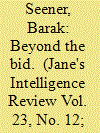

|
|
|
| 10 |
ID:
116187
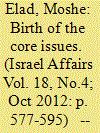

|
|
|
|
|
| Publication |
2012.
|
| Summary/Abstract |
In the past two decades the Israeli-Palestinian conflict has been identified with the dispute over four core issues: the future of East Jerusalem, the Jewish settlements in the disputed territories, the final borders between the two sides, and the fate of the Palestinian refugees. The first three issues were born during the first 10 years of Israel's control of the West Bank and East Jerusalem, while the refugee problem dates back to the 1948 war. Yet it was the Israeli administration from 1967 to 1976 that exposed the refugee camps to the Israeli public and led to initial efforts to resolve this problem. This first half of the two-part article outlines the establishment of the Israeli administration in the West Bank and East Jerusalem and lays the ground for the creation of the core issues which will be described in the second part.
|
|
|
|
|
|
|
|
|
|
|
|
|
|
|
|
| 11 |
ID:
127938
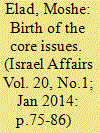

|
|
|
|
|
| Publication |
2014.
|
| Summary/Abstract |
In the last two decades, the Israeli-Palestinian conflict has been highly identified with the dispute over the core issues: Israel's annexation of East Jerusalem, the establishment of settlements in the disputed territories, the final borders between the two parties and the Palestinian refugee problem. The first three issues were a result of the 1967 war, while the refugee problem was a corollary of the 1948 war. However, it was the Israeli administration from 1967 to 1976 that exposed refugee camps to the Israeli public and made some initial efforts to resolve the problem.
|
|
|
|
|
|
|
|
|
|
|
|
|
|
|
|
| 12 |
ID:
094727
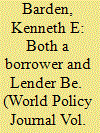

|
|
|
| 13 |
ID:
053343
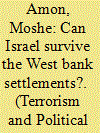

|
|
|
| 14 |
ID:
028991
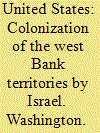

|
|
|
|
|
| Publication |
Washington, United States Government Printing office, 1977.
|
| Description |
184p.pbk
|
|
|
|
|
|
|
|
|
|
|
|
Copies: C:1/I:0,R:0,Q:0
Circulation
| Accession# | Call# | Current Location | Status | Policy | Location |
| 019056 | 325.3105694/USA 019056 | Main | On Shelf | General | |
|
|
|
|
| 15 |
ID:
121450
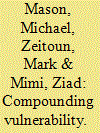

|
|
|
|
|
| Publication |
2012.
|
| Summary/Abstract |
Coping with (and adapting to) climatological hazards is commonly understood in intergovernmental and aid agency fora as a purely technical matter. This article examines the UN Development Programme's stakeholder consultations in the West Bank and Gaza Strip in order to challenge the donor-driven technical-managerial framing of Palestinian climate vulnerability by showing how Israeli occupation practices exacerbate environmental stresses. While emphasizing the importance of social, economic, and political contexts in shaping populations' responses to climate change in general, the authors demonstrate the multiple ways in which the occupation specifically compounds hazards reveals it as constitutive of Palestinian climate vulnerability.
|
|
|
|
|
|
|
|
|
|
|
|
|
|
|
|
| 16 |
ID:
123091
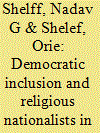

|
|
|
|
|
| Publication |
2013.
|
| Summary/Abstract |
NADAV G. SHELEF and ORIE SHELEF discuss the voting behavior of Israeli religious nationalists in the elections of 1999 and 2009. Their analysis suggests that the democratic inclusion of radical movements may not lead to moderation.
|
|
|
|
|
|
|
|
|
|
|
|
|
|
|
|
| 17 |
ID:
171676
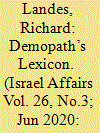

|
|
|
|
|
| Summary/Abstract |
This article examines a double discourse by the Palestinian leadership, one in English and one in Arabic, which plays a central role in their negotiating strategy with Israel since the onset of the Oslo ‘peace process’ (1993). Using language very close to Western terminology, Palestinians in English speak of ‘Occupation’ and ‘Settlements’ with the 1967 borders as the defining issue; while in Arabic, they speak of ‘Occupation’ and ‘Settlements’ in terms of the 1948 borders (i.e., all of Israel is an ‘Occupation’ and Tel Aviv is an illegal ‘settlement’). As a zero-sum negotiating strategy this makes perfect sense: convince Israel to concede ‘land for peace’ (1967 borders), when in reality this means ‘land for war’ (1967 borders as launching pad for war to 1948 borders). The western news media, allegedly committed to accurate reporting, shows no knowledge of the Arabic discourse and presents what Palestinians say in English as reliable reflections of their actions and intentions. As a result of this failure to identify the double-discourse, the Western legacy media presents Palestinian war propaganda as news to their Western audiences, unwittingly helping the Palestinians in their deception.
|
|
|
|
|
|
|
|
|
|
|
|
|
|
|
|
| 18 |
ID:
127175
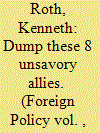

|
|
|
| 19 |
ID:
151683
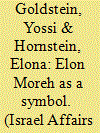

|
|
|
|
|
| Summary/Abstract |
While the establishment of the Elon Moreh locality in the second half of the 1970s constitutes an important milestone in the evolution of post-1967 Jewish settlement in the biblical lands of Judea and Samaria (or the West Bank as they have been known since their 1950 Jordanian annexation), the episode has been surprisingly neglected by the professional literature. This article seeks to fill that lacuna by exploring the factors and circumstances underlying this momentous event, as well as the political and legal struggles attending its occurrence. As such, it not only offers the first comprehensive historical account of this episode but also shed important fresh light on one of the more intractable aspects of the Israeli‒Palestinian conflict.
|
|
|
|
|
|
|
|
|
|
|
|
|
|
|
|
| 20 |
ID:
100566
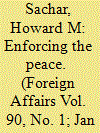

|
|
|
|
|
| Publication |
2011.
|
| Summary/Abstract |
The Israelis and the Palestinians will never find peace if they are left to negotiate on their own. As has been the case throughout history, great-power leadership is the missing ingredient. Washington must lead the way in enforcing a final-status settlement.
|
|
|
|
|
|
|
|
|
|
|
|
|
|
|
|
|
|
|
|
|